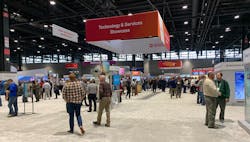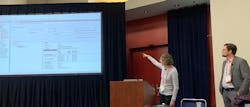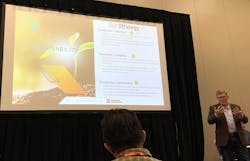3 Critical Factors for Industry’s Future
At Automation Fair 2022 and its accompanying Process Solutions User Group event, Rockwell Automation devoted a great deal of focus to three issues it sees as critical to industry’s future: cybersecurity, sustainability, and workforce enablement.
Cybersecurity
Whether it’s a municipal water operation or a manufacturing plant, the accelerated shift to remote facility monitoring in response to the COVID pandemic has put an even brighter spotlight on cybersecurity. In response, Rockwell Automation presented several strategies for increased cybersecurity.
At the two-day Process Solutions User Group (PSUG) which preceded Automation Fair, Tim Mirth, Rockwell Automation’s platform leader for PlantPAx, and Diane Golden, system security architect, hosted a session about cybersecurity best practices related to the company’s PlantPAx, FactoryTalk, and MyEquipment software.While much of the focus for industrial cybersecurity has been on protecting control systems from outside intrusion, Golden and Mirth emphasized that breaches from within a company—whether intentional or accidental—should not be overlooked. That means taking a granular view of all access points, including locking down USB ports, protecting individual PLCs, tightening authentication and authorization for access, and segmenting operations so that, if an intrusion happens, it’s limited to a small portion of a facility.
“I recall going to a site [and connecting a computer] to their network,” recalls Mirth. “When I plugged into their network, Windows started updating instantly. It turns out someone at the site [had installed] their own modem because they wanted to use it to communicate [for personal reasons] and forgot they left it on. So, the whole time, this location was completely online and anyone could find it. For those types of situations, having network segmentation doesn’t necessarily prevent [the problems], but with segmentation you’re reducing the threat landscape.”
Regarding user authentication and authorization, Golden says it’s about empowering those devices to know what they’re communicating with and from what systems they can accept directives. “Today, we do a lot of this in the FactoryTalk ecosystem, leveraging Microsoft Active Directory,” she says, adding that PLCs should be secured to the FactoryTalk Directory too. “If you don’t secure them, someone can walk in with a laptop and their own FactoryTalk Directory and talk to any of your PLCs.”
Later, during an Automation Fair session on cybersecurity, Nicole Darden Ford, Rockwell Automation’s vice president of global security and chief information security officer, along with Rachael Conrad, Rockwell Automation’s vice president and general manager of customer support and maintenance, detailed how the manufacturing has gone from a cybersecurity afterthought a decade ago to the second-most targeted industry today.
“The threat actors have figured out that the OT (operations technology) environment is the place to go,” said Darden Ford. “They know there are unpatched systems, that we don’t have [secure] asset management, and that a lot of the legacy devices have been there for years. They use that to get into the OT environments. So, what we’re doing at Rockwell is educating our customers and organizations around what they can do.”
That education, according to Ford and Conrad, includes applying Rockwell Automation’s five-pillar program for OT security: executive leadership and funding; dedicated team with domain expertise; single governance and policy framework; an ecosystem of trusted partners; and a unified cyber risk program.
To help install those pillars, Rockwell Automation acquired two cybersecurity companies in 2020: Avnet and Oylo. “Between those two companies, we got 200 new cybersecurity experts, which doubled our cybersecurity in our services, and we’re able to leverage that across all protocols,” said Conrad.
Sustainability
Eco-friendly manufacturing practices are top-of-mind across the industry, and were discussed in detail at several sessions during PSUG and Automation Fair. There was a clear focus on how Rockwell Automation is converting data into insights for sustainability and productivity around energy, water, and waste.
“Our view on sustainability is that it’s got to be connected,” explained O’Reilly. “Productivity and sustainability have to be one. For example, in our industrial energy management software, we integrated it with the control platform to drive productivity. We’re helping enable the contextualization of energy data at the controller while you’re controlling the machine and process [so that users] can actually know the energy data on a servo motor and optimize the output of that servo motor at the same time. That’s why the integration of productivity and sustainability is core. It can’t be a standalone system by itself.”
Workforce strategies
“The talent war is over, and talent won,” said Jimmy Etheredge, CEO of Accenture North America during a one-on-one discussion with Rockwell Automation CEO Blake Moret during Rockwell’s Automation Fair. “We’re all going to have to be more flexible with how we are attracting talent, how we are developing talent, and how we’re retaining talent.”
While Etheredge oversees 80,000 employees in North America, companies of all sizes are experiencing the crunch of a perpetually dwindling talent pool. Labor was perhaps the most discussed topic at PSUG and the Automation Fair, with many sessions touching on the subject.
Currently, a workforce gap of 800,000 jobs exists in manufacturing, mainly due to a higher overall demand for goods, and more complicated production needs focused on customization and variety. “We’re doing a pretty good job of replacing the workers that are leaving,” said Dave Vasko, senior director of advanced technology at Rockwell Automation. “But we’re looking at 4 million additional jobs by 2030. We think we can fill about half of that, but that still leaves a gap of about 2.1 million.”
Vasko and Jerry Foster, chief technology officer at Plex (a Rockwell Automation company focused on production software and technology platforms), delivered a session about how automation, artificial intelligence, robots, cobots (collaborative robots), augmented reality, digital twins, and the cloud can help workers take on more important roles within a manufacturing facility by eliminating repetitive-motion jobs and giving workers the tech tools to succeed.
“Let’s say you have a line worker at home,” said Foster. “They can go into their living room, put on virtual reality goggles and be presented with a digital representation of their machine and work center. As they interact with that digital scenario, a signal is sent to the actual physical representation of the same machine in a factory miles away that actually runs and does the job.”
At another session focused on digital transformation in the food and beverage industry, the panel discussion veered into labor issues and, specifically, how the tribal knowledge of an experienced machine operator can be passed on via technology to the next generation.
“We have a line operator who loves TikTok,” said panelist Brian Marsh, senior director of digital manufacturing at Nestlé. “He loves TikTok so much that he started creating videos on how to do different things on the line. My team can build a training video, but what he was doing was much better. We had people laughing on the floor and everybody wanted to see that video. We’re now trying to create a new job for him because of his passion around making those videos. So, if you see what I call the ‘bright lights’ in your organization, try to embrace them, even if it means creating a new job for that individual within your organization. They love what they’re doing and they’re going to be more passionate than anybody you’ll find outside your organization.”




